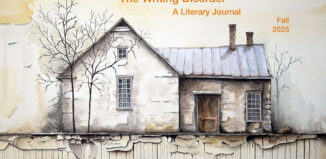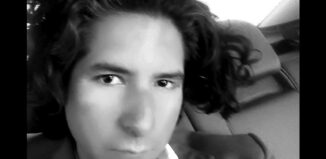The Commie Squirrels of Chisholm Lookout
by Allen Billy
The spring and summer of 2023 represent the worst wildfire season on record in Canada.
Thousands and thousands of hectares of forest, meadows, and muskeg were consumed by fast-moving fires. Multiple communities and farms were endangered. Thousands of people were traumatized by evacuations – leaving behind homes and possessions and not knowing if they would return to structures or ash. Several firefighters were killed or injured combatting these blazes. This was a year of danger, stress, and bad, smoky air in northern forests.
I had the great fortune to be selected as one of 127 lookouts in the province watching finding and reporting wildfires. I was assigned to a relatively remote tower in northern Alberta known as Chisholm Lookout. Many of you may be familiar with this location as it is located in the bush roughly halfway between the hamlets of Flatbush (population 30 in a good year) and Smith (population 227 if there are not a lot of accidents). Smith is the major hamlet in the region and has a store. Smith also has a website and proudly boasts its two main attractions: thousands of acres of forest and lots of resident wildlife.
My compound contained the Tower which is a small cupola atop a 33-meter ladder (or hundred feet for people unfamiliar with the metric system). My job was to climb this ladder at least once each day from mid-April to the end of September and report any observed smokes and/or lightning strikes. I would be in the cupola roughly eight to ten hours every day depending on the fire hazard. There were no breaks for weekends or holidays. My area of responsibility extended to the horizon in all directions, which encompassed about 5,042 square kilometers or 1947 square miles.
An exciting aspect of the work is that you occupy the tower during lightning storms. Lookout observers track and record where lightning strikes the forest as fire or smoke might appear at that location a few days or even weeks later. My tower was struck by lightning once while I was in it. Quite dramatic – a brilliant flash of light and a booming explosion sound right above me. Fortunately, the cupola is a Faraday cage and conducts the electricity from the lightning bolt deep into the ground.
The compound also contains a helipad, a nice cabin, an outhouse, an equipment shed, and a weather station. I didn’t use the outhouse at night as I didn’t want to surprise a bear, cougar, or wolf that may be in the yard.
While wildlife represents a threat to an individual living by himself in the bush, the biggest danger lookouts faced was loneliness and social isolation. While a lookout can make several radio calls each day to other lookouts and the fire district headquarters, we would normally see a real person just once a month when our food and water supplies were brought in. Social isolation becomes more of a hazard as the fire season progresses month by month. Some lookout observers crack under the strain, but fortunately, that didn’t happen to me.
I enjoyed watching wildlife from the cupola and saw herds of elk and deer, flocks of sandhill cranes, a few bald eagles, and a resident marmot on a regular basis. I also had the opportunity to listen to the chirps, yowls, growls, and bugling that came from animals hidden in the bush.
As the summer unfolded, I became aware of another wildlife hazard that surprised and shocked me – commie squirrels. My awareness of these creatures grew slowly through the early summer months. As the number of visible fires decreased after the first couple months, I was able to spend more time watching for wildlife in and near my compound.
I didn’t pay much attention to the squirrels when I first settled in at the Lookout. The area was surrounded by wildfires throughout April and May and my focus was on spotting fires and trying to keep the forest and local communities from burning. I spent my days watching known fires and scanned hundreds of square kilometers for new fires. When June arrived, the weather switched from hot and dry to wet and soggy. Many of the communities that were under fire evacuation orders were suddenly under flood warnings and evacuations as local rivers overflowed.
What I did notice about the squirrels in the early months is that there were ten resident squirrels with small territories in a rough circle along the perimeter of the compound. The compound was crisscrossed by multiple tiny trails worn into the ground by individual squirrels going back and forth from their home tree to a food source and back again. Each squirrel would travel along their trails dozens of times each day as they stockpiled food and warned off intruders. I could hear them sometimes chattering at each other when territorial boundaries were violated.
The squirrels in my compound were Red Squirrels (Tamiasciurus hudsonieus) a tree-dwelling species found across Canada and the United States. This species has also expanded its range far to the south – almost to the Mexican border in some states.
As the local forest dried out from the June rains, I noticed a dramatic change in the behaviour of the resident squirrels. This behavioural shift seemed to be correlated with the appearance of an unusually large squirrel, maybe forty to fifty percent larger than the resident squirrels. I ended up calling this individual Big Red as he stood out in a cluster of squirrels.
Big Red took over a cluster of evergreens close to the center of the compound and at some point in July, I noticed that the resident squirrels had pounded out new trails from their home trees to Big Red’s cluster of trees. Big Red’s territory was now a central location to which all of the resident squirrels started delivering food. Chattering between neighboring squirrels dropped noticeably as territorial disputes seemed to drop in frequency.
As the forest was damp and new fires were rare, I spent more time watching the squirrels from the cupola. What I observed puzzled me. All of the resident squirrels were delivering food to Big Red’s territory and large stockpiles of food accumulated around the trees in Big Red’s rather large territory. Later in the afternoon each day, resident squirrels came to the central territory to fill their cheek pouches with food, and then returned to their home territory. It looked like Big Red and his squad of crony squirrels were controlling the collection and distribution of food. Yes – Big Red had cronies. These squirrels seemed to be some sort of enforcers as they pounced on some squirrels and tumbled with them in fights. Big Red never seemed to fight.
Early in the summer I observed resident squirrels collecting pieces of mushrooms and toadstools and set this material on branches to dry in the sun. Once dried, the material was carried into a resident squirrel’s food cache. This normal squirrel behaviour now seemed to occur only in Big Red’s territory … and on an industrial scale. As part of the ongoing food deliveries to the central territory, all the resident squirrels brought pieces of fungus to one particular fallen tree. For much of the summer, this food item was gathered, dried, and stored, by the worker squirrels.
One morning, I woke up shortly after dawn to the sounds of a commotion in the compound. I looked out the kitchen window and saw Big Red on a stump, chattering, tail-flicking, stomping his feet and waving his paws in the air. Most of the resident squirrels were clustered around the stump and seemed to be listening to Big Red. After each display by Big Red, the crowd of squirrels near the stump and in the trees responded with chattering, hopping, tail-waving, and foot stomping. I was pretty sure I could hear Big Red’s squeaky voice saying things like “proletariat”, “means of production”, and “state control”.
I was astounded as the squirrels were having some sort of group meeting or rally. I didn’t think this was normal squirrel behaviour.
After hearing Big Red’s speech, I was convinced that I was watching a group of Commie Squirrels. They had centralized their food production and storage efforts and all the squirrels worked cooperatively. Private territories no longer existed.
Each week, the group meetings became louder and more squirrels joined in from neighbouring forest areas. Not sure where these new squirrels came from but I could count up to twenty-five squirrels clustered together at some of these events.
One morning, I got up, dressed, and strolled out of my cabin towards the morning squirrel rally. As I approached the assembled squirrels, the chattering stopped, but the squirrels didn’t run away. They just turned to look at me. This was quite disconcerting. I stared back at the squirrels and decided to try getting a bit closer.
Moving closer was a mistake. Big Red chattered something and a cadre of his enforcer squirrels charged toward me. Since I didn’t want to be bitten by wildlife while in an isolated location, I turned and scurried back to my cabin and closed the door. Much to my surprise some of the squirrels deliberately slammed their bodies into the screen door and tried to get past the door.
From that moment on, I realized that there would be conflict between the squirrels and myself. Thinking I needed to report this development to headquarters, I went into the radio room and picked up the microphone. I was about to activate the microphone when one of the voices in my head offered a caution.
The Short, Stout Voice wisely suggested: “Don’t call headquarters just yet. The squirrels may be monitoring your radio calls and if you sound the alarm, they may do something drastic”
That seemed like good advice so I put down the microphone and watched the squirrels from various windows on the side of the cabin facing the squirrel assembly area.
Nothing really unusual happened for a while. The squirrel rallies continued, more new squirrels appeared in the compound from somewhere, and the chattering became louder. On one occasion, I observed all the squirrels turn to look at my cabin for a couple moments while Big Red chattered away. It bothered me that a group of squirrels was doing the same thing at the same time.
The Tall, Skinny Voice was concerned that the squirrels were “up to something.” A couple of the other Voices in my head agreed with that assessment.
One evening after midnight a few days later, several squirrels climbed up to the tin roof of my cabin while I was asleep. Then they all started stomping on the roof and made a tremendous racket. I pounded on the bedroom wall and yelled at the ceiling. My response didn’t deter the rodents, but after a few minutes they stopped on their own and seemed to leave the roof. I fell asleep for a couple of hours, but they came back and repeated the roof drumming behaviour again a couple hours before dawn. I didn’t get much sleep that night.
Nor did I get much sleep the next couple of nights. The squirrels returned and did their best to disrupt my sleep at least a couple of times each night. This was starting to annoy me and some of the Voices.
The Solemn, Gruff voice said: “You need to strike back. Stop being such a wiener and fight back.”. Other Voices murmured agreement.
After a week of bad sleeps, I decided it was time for me to strike back. During the day when the squirrels were busy gathering food, I attached an electric pump and a fire hose to the large water storage tank next to the cabin. The pump was put in position and when plugged in, a steady blast of water would come through the hose. I then positioned a ladder near the pump that allowed me to access the roof quickly.
The Cautious Voice insisted I wear gloves and practical shoes when climbing the ladder.
That night I didn’t sleep in the bedroom. Instead, I wrapped myself in a blanket and tried to sleep on the floor next to the cabin door. This would save a bit of time when I had to quickly leave the cabin and climb to the roof when the squirrel roof dance started. It was my turn to respond to this series of sleep deprivation squirrel attacks.
The roof drumming started again shortly after midnight. I quietly slipped out of the cabin, making sure the screen door did not squeak too much. I plugged in the electric pump, picked up the fire hose, and with great stealth and care not to make too much noise, ascended the ladder. When I got to the eaves level, I could see the squirrels dancing on my roof, chattering and stomping with great enthusiasm. They seemed to be having fun.
I grinned as well when I turned the hose nozzle to stream and let the squirrels have what the Historian Voice called the Chisholm Hose Attack. I blasted a few of the squirrels right off the roof and soaked the rest quite nicely. The tree rats ran off the roof chattering in outrage and fear.
I stowed the hose away so the squirrels wouldn’t gnaw on it, and tried to sleep. I suspect the adrenalin rush from the combat kept me up the rest of the night. While I didn’t sleep, the squirrels didn’t come back, so I counted that development as a minor victory.
The Voices chattered all night, which didn’t help me fall asleep. Different groups of Voices argued through much of the night. Some felt that my attack would subdue the squirrels, others thought we were moving into some sort of escalated conflict.
The next four days were quiet. Very little noise came from Big Red’s territory, no more roof dancing occurred.
However, when I woke up one morning, an odd odour was quite noticeable. As I checked my cabin room by room, I discovered that all my windows were smeared with excrement. There were huge piles of animal droppings forming a layer of crap all over the sundeck adjacent to the cabin door. Animal crap was piled and smeared on all the compound walkways to the tower, equipment shed, and outhouse. My compound was suddenly filled with moose, deer and rabbit pellets, bear dung, coyote droppings, and a great variety of squirrel, bush rat, and marmot droppings. I also noted my screen door had been urinated on, probably by dozens of squirrels. As the sun rose, the stink became overwhelming. My eyes watered from gases rising from the mounds and layers of crap.
I didn’t go up the tower that morning. It took me an entire day to hose down the affected areas, sweep the pathways, and shovel the piles of feces into the outhouse. Then the bleaching of all stained surfaces took quite a bit of time and made my eyes water for another reason. At the end of the day, I went to the side of the cabin and screamed obscenities at the squirrels. Some of the Voices joined in as well, and I was quite impressed with some of the phrases they came up with.
There was no response from the dung-hauling squirrels, but I could see little squirrel heads watching me from the brush ringing the compound.
All was well for a couple of days, and then the squirrels repeated their crap attack. It took me another entire day to clean up the mess. I realized I had to strike back with an attack that would irritate the squirrels. I had to take drastic action using the resources I had at hand. It was my turn to direct some chemical warfare against the commie squirrels.
I had a series of meetings with the Voices that knew things about military operations and we developed a brilliant plan to attack the squirrel collective.
I armoured up and put on my steel-toed boots, hard hat, and thickest work gloves. goggles and heavy fire-resistant coveralls. My coveralls had deep pockets and I gathered as much ammunition as possible from the kitchen. Most of my spices went into my pockets: hot and black pepper, garlic powder, cinnamon powder, onion powder and some unknown powders from bottles that had lost their labels. I filled a couple spray bottles with vinegar. One pocket contained lighter fluid and a lighter. The last thing I did before leaving the cabin was set up my CD player near a window facing the squirrels and loaded “The Flight of the Valkyries”. I turned up the volume and stepped out of the cabin ready to initiate my raid.
As I walked slowly towards the Squirrel Zone of the now divided compound, the squirrels stopped what they were doing and stared at me. I halted about five meters from Big Red’s home tree and took the tops off the various spices, and placed them upright in various pockets. I held the lighter fluid in one hand and the lighter in the other hand. A spray bottle containing vinegar was clipped to my belt.
I checked to make sure the Voice were ready to attack. Then I charged.
I screamed all sorts of profanities at the squirrels and denigrated their evolutionary history. The Voices were yelling battle cries and curses.
I rushed the various food caches the squirrels had established and sprayed lighter fluid on many of the caches and into the food storage holes. I then lit the lighter fluid and moved on to my next set of objectives.
I spun around, and sprayed spices and vinegar both the food stores and drying mushrooms that were not burning and on squirrels within range. I stomped on piles of food and threw spices in all directions. The smoke in the area became thick and some of the Voices were coughing.
Meanwhile, the squirrels acted defensively. I was pelted from above with pine cones and small twigs. Some of the squirrels charged me and tried to bite through the coveralls. I swatted them away, screamed profanities and various battle cries, and continued to spray spices in every direction. Once I ran out of spices and vinegar, I retreated back to the cabin. Roughly halfway home, I decided I was going to mark my territory and urinated to create a line in the grass. I considered the attack to be a very successful raid.
The fire season wound down over the next couple of weeks and I had to close up the compound and prepare to head back to civilization. The war between the squirrels and myself settled into an unofficial truce. I stayed on my side of the urine line and they stayed away from the cabin. I stayed away from Big Red’s territory and he and his cronies stayed away from my territory.
I did see small groups of squirrels fill their cheek pouches with food and then leave the compound in small groups. Clearly they were heading off somewhere on squirrel missions.
Before I left, I realized that the squirrels were indeed communists. They had established a centralized economy and Big Red controlled both the means of production and the distribution of goods. There was no internal dissension as Big Red ruled the squirrel collective with a firm and ruthless paw. I observed squirrels beaten up because they took too much food or were slow in bringing food to the central caches. Big Red ruled over the compound considered squirrel territory. Big Red owned all the squirrel territories, there was no private ownership of squirrel territories. My cabin, tower, and outhouse were outposts of anti-communism. I felt good about that, quite pleased that I had resisted commie expansion into my freehold.
When the last day of my lookout observer contract arrived, I loaded up my vehicle and prepared for the long drive back to the city. Just before settling into the car, I looked at squirrel central and saw Big Red. He stared at me for a moment and then tail-flicked, stomped, and chattered. The little rat! He thought he had won!
I flipped him the appropriate finger and yelled out: “I’ll be back you little commie. I’ll be back!”.
He chattered something back at me, jerked his right forearm into the air, and I think he said something like “… you!”.
Various Voices in the back seat screamed back at Big Red and used some colourful language as to what his could do with his various body parts.
While the fight against commie squirrels will continue at Chisholm Lookout, the Red Squirrels continue to rapidly extend their range throughout North America.
Be alert! Commie squirrels may be moving into your neighbourhood one garden at a time.
BIO
Allen Billy works on professional misconduct hearings in the K-12 education system within Alberta and on wildfire detection projects. His Zoology degrees are from the University of Texas at Austin (Ph.D.) and the University of British Columbia (M.Sc. and B.Sc.). His hobbies are geocaching, metal detecting, and bird watching.



















